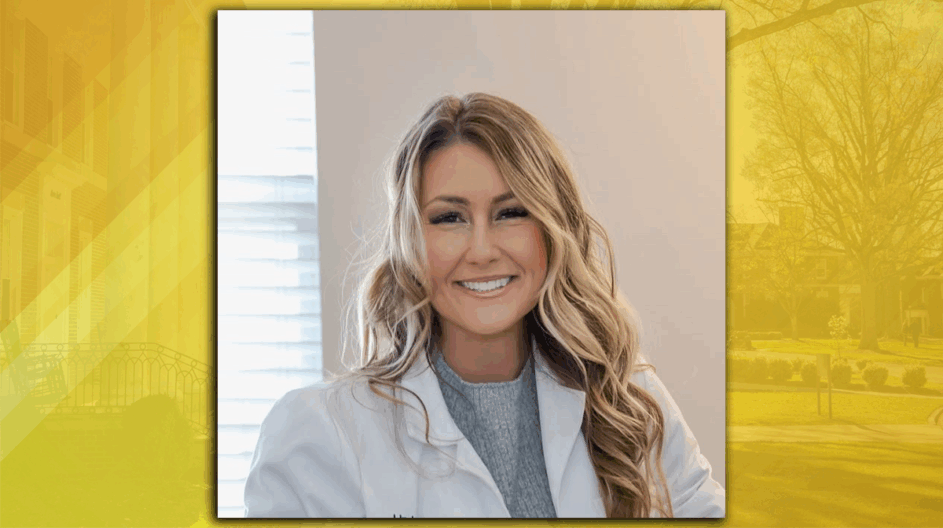
Lindsey Russell Receives Presidential Merit Award
Lindsey Russell ’15, the recipient of Pfeiffer University’s 2025 Presidential Merit Award, has landed at the forefront of technology-driven changes in healthcare, having worked as a Family Nurse Practitioner (FNP) for Atrium Health Primary Care Family Medicine Virtual since May 2024. She has joined a growing number of healthcare providers working virtually in family medicine — a trend sparked a few years ago by the COVID-19 pandemic. And she has no intention of leaving telehealth.
“I will remain in virtual primary care for as long as virtual primary care is a thing,” she said. “My colleagues and I work hard, but we have a really good time doing it.”
As an FNP who works virtually, Russell “technically” works under a supervising physician but says she still enjoys “autonomy” to see patients by herself and without the need for the physician “to sign off on things.” She conducts consultations with her patients from her Concord, N.C. home through video calls via laptops or smartphones, instead of during in-person visits at a clinic. These sessions inform many things she does for her patients: ordering diagnostic tests, prescribing medications, developing treatment plans, and managing conditions such as hypertension, diabetes, anxiety and depression. She’s also able to connect patients with an array of resources in areas such as behavioral health and social work.
And as emerging technology becomes more widely available, she’ll come to rely increasingly on a remote examination device to record an at-home patient’s temperature and sounds (from the heart, lung and abdomen), and to take pictures of their ears, throat, and skin conditions.
Russell sees what she does as a way of improving access to care. “We’re gaining in popularity because folks might not have transportation to a doctor’s office or they may not have the ability to be able to take time off from work,” she said. “Or maybe, they just feel really sick and don’t feel like driving.”
Russell’s work also includes administrative duties such as helping onboard other virtual providers and working “really closely with my team to develop new strategies and new goals and determining how we can reach our goals so that we can serve our patients better.” Her journey to her current role has been an intriguing one:
She got her first taste of treating patients in an emergency room during and after her Bachelor of Science in Nursing studies at Pfeiffer, where she was “an exceptional student … who handled the demands of nursing school while participating in athletics (softball),” said Dr. Dana Martin, a Professor of Nursing who serves as the Interim Department Chair of the program.
After that, Russell, who completed her education as an FNP in 2019 with a master’s degree from Western Carolina University, gravitated to family medicine. The move afforded her an opportunity to “develop closer relationships with patients” than was possible in an ER environment. And she liked the fact that a relationship with one member of a family often evolved into relationships with other members across multiple generations. She said she now prefers practicing family medicine in a virtual environment rather than at a conventional clinic, which made her more prone to burnout.
A lot of what Russell does online with patients is discussing where they are in a particular treatment journey and then making adjustments. An ability to communicate “clearly and concisely” is key to doing this well, as is trying “to keep that human aspect, even though I can’t touch my patient or I’m not sitting in front of them.”
Russell also possesses an ability to adapt to inevitable changes in technology that her specialty continues to experience.
“Things are always evolving, and they’re always changing,” she said. “It’s important to be open to that.”
Russell’s work in virtual primary care has begun to gain the positive attention of her peers. The most recent evidence of that was a wide-ranging interview in the April issue of Medical Professionals Charlotte. In it, she illuminates what motivates and satisfies her the most about her work.
A CrossFit enthusiast who’s made some form of daily activity a nonnegotiable, Russell strives to be what she calls “the healthiest version of myself that I can be so that I can be a good example for my patients.”
Perhaps, her greatest job satisfaction emerges when she gets to play a pivotal role in a patient’s success story.
“(T)hat is so rewarding because I know I made a big impact on their health,” she says. “I love success stories where (for example) patients quit smoking so they can work out in the gym, play catch with their grandkids or walk their dog more easily.”
One of the things she says she values most is helping drive “the virtual aspect of healthcare,” which “is so innovative.” “I have seen in just a few years how much it has grown, and what an incredible difference it can make for healthcare.”